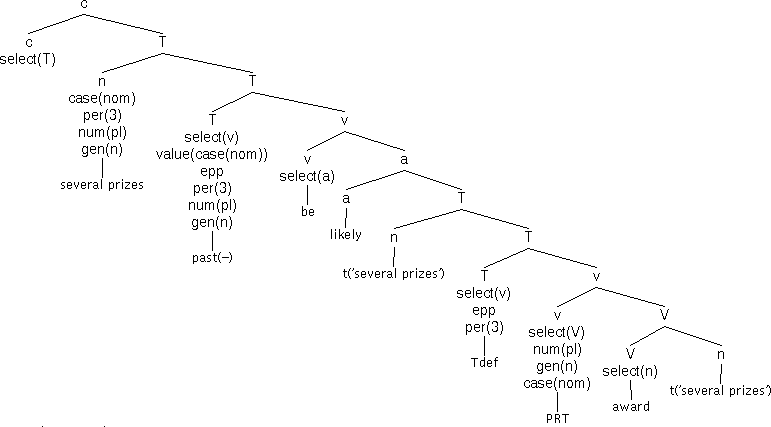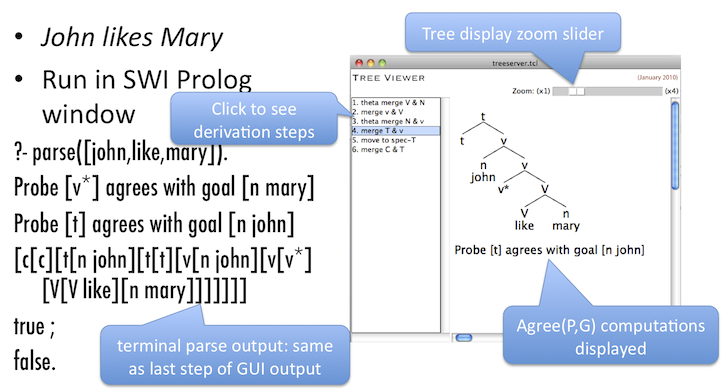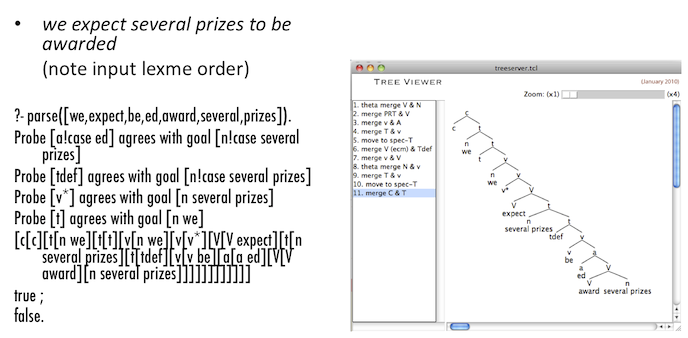
Sandiway Fong
Departments of Linguistics and Computer Science
University of Arizona
I am interested in computational aspects of the Minimalist Program; in particular, I am interested in research into parsing mechanisms.
[Example of parser output.]

Download paper: here (10 pages, draft July
2012)
Based on talk: Minimalist Parsing: simplicity and feature unification
Conference on Language and Recursion. University of Mons,
Belgium. March 14-16th 2011.
Slides: here (36 slides)
Webpage: Examples and derivations. Summary of theory: here
Computation with doubling constituents: Pronouns and antecedents in
Phase Theory. Fong, S. and J. Ginsburg
In Towards a Biolinguistic understanding of
Grammar: Essays on Interfaces, John Benjamins 2012
Download paper: here (35 pages, updated: July 2012)
Talk: A Computational Implementation of Syntactic Binding
Theory in the Minimalist Program.
2nd Joint Arizona State University (ASU)/University of Arizona (UA)
Linguistics Symposium. Tempe, AZ. October 1st 2011.
Slides: here (57 slides)
Webpage: Examples and derivations. Summary of theory: here
Minimalist Parsing and Japanese: On theory and experiental factors Fong, S. and Y. Hirose
(5/31/05) To appear in The Proceedings of Tokyo Conference on Psycholinguistics (TCP 2005)
Download paper: tcp05b.pdf (21 pages)
Mechanisms for the Minimalist Program: On SOV Languages and Relativization Fong, S.
Draft.
Abstract:
This paper examines computational issues in the processing of SOV languages in the probe-goal framework, a theory in the Minimalist Program (MP). A generative theory that seeks to minimize search, such as the probe-goal model, provides a strong linguistic basis for the investigation of efficient parsing architecture. For parsing, two main design challenges present themselves: (1) how to limit search while incrementally recovering structure from input without the benefit of a pre-determined lexical array, and (2) how to come up with a system that not only correctly resolves parsing ambiguities in accordance with empirical data but does so with mechanisms that are architecturally justified. We take as our starting point an existing probe-goal parser with features that allows it to compute syntactic representation without recourse to derivation history search. We extend this parser to handle pre-nominal relative clauses of the sort found in SOV languages. In doing so we tie together and provide a unified computational account of facts on possessor (and non-possessor) relativization and processing preferences in Turkish, Japanese and Korean.
Download paper: sov.pdf (19 pages)
Computation with Probes and Goals: A Parsing Perspective. Fong, S.
In Di Sciullo, A. M. and R. Delmonte (Eds.) UG and External Systems.
Amsterdam: John Benjamins. 2005 (in press)
Abstract:
This paper examines issues in parsing architecture for a left-to-right implementation of the probe-goal Case agreement model, a theory in the Minimalist Program (MP). Computation from a parsing perspective imposes special constraints. For example, in left-to-right parsing, the assembly of phrase structure must proceed through elementary tree composition, rather than using using the generative operations MERGE and MOVE directly. On-line processing also poses challenges for the incremental computation of probe/goal relations. We describe an implemented parser that computes these relations and assembles phrase structure, whilst respecting the incremental and left-to-right nature of parsing. The model employs two novel mechanisms, a Move and a Probe box, to implement efficient parsing, without "lookback" or unnecessary search of the derivational history.
Download paper: venice1.pdf (22 pages)
Computational Implementation
Definite clause grammar implementation (DCG). See Mons 2011 slides and
example/derivations webpage for details.

